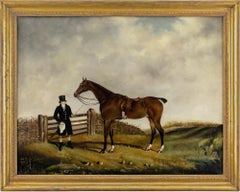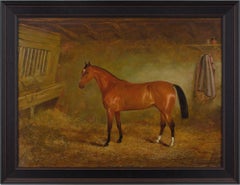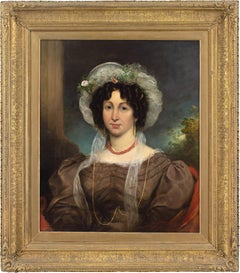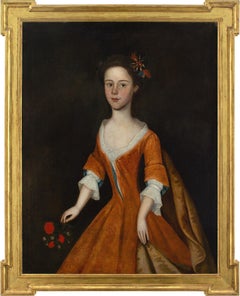Video Loading
Want more images or videos?
Request additional images or videos from the seller
1 of 14
Edward GarrawayEdward Garraway, Portrait Of ‘Tottie’1888
1888
Price:$1,647.44
About the Item
- Creator:Edward Garraway (1842 - 1893, English, British)
- Creation Year:1888
- Dimensions:Height: 21 in (53.34 cm)Width: 25 in (63.5 cm)
- Medium:
- Movement & Style:
- Period:
- Condition:Cleaned. One patched repair. The small white dabs are highlights not paint losses. Frame with various marks and showing its age.
- Gallery Location:Cheltenham, GB
- Reference Number:1stDibs: LU2328215180912
About the Seller
5.0
Platinum Seller
Premium sellers with a 4.7+ rating and 24-hour response times
Established in 2017
1stDibs seller since 2023
245 sales on 1stDibs
Authenticity Guarantee
In the unlikely event there’s an issue with an item’s authenticity, contact us within 1 year for a full refund. DetailsMoney-Back Guarantee
If your item is not as described, is damaged in transit, or does not arrive, contact us within 7 days for a full refund. Details24-Hour Cancellation
You have a 24-hour grace period in which to reconsider your purchase, with no questions asked.Vetted Professional Sellers
Our world-class sellers must adhere to strict standards for service and quality, maintaining the integrity of our listings.Price-Match Guarantee
If you find that a seller listed the same item for a lower price elsewhere, we’ll match it.Trusted Global Delivery
Our best-in-class carrier network provides specialized shipping options worldwide, including custom delivery.You May Also Like
English 19th century portrait of Lord Methuen's favourite dogs
By William Barraud
Located in Bath, Somerset
A painting of Lord Methuen’s Spaniels Gipsy and Fairy, by William Barraud, standing beside a classical urn in a landscape by a lake, probably in the grounds of Corsham Court in Wiltshire, the Methuen family country seat. Signed and dated 'W Barraud...
Category
19th Century English School Animal Paintings
Materials
Canvas, Oil
$26,193
H 32.01 in W 40.95 in
English 18th century portrait of a water spaniel dog standing in a landscape
By George Stubbs
Located in Bath, Somerset
Circle of George Stubbs (1724-1806). English 18th century portrait of a water spaniel standing in a wooded landscape.
This charming painting is a wonderful example of the style of English dog painting made popular by artists such as George Stubbs and other sporting artists working in England in the 18th century who painted the dogs and horses of the aristocracy and wealthier classes. It follows in the ancient tradition of celebrating and commemorating our faithful canine companions through portraiture.
Oil on canvas in a giltwood frame
Provenance: Private collection, Somerset
George Stubbs (1724-1806) was classified in his lifetime as a sporting painter, and as such was excluded from full membership of the Royal Academy. He is best remembered for his paintings of horses and his conversation pieces. Having studied anatomy, Stubbs's pictures of horses are among the most accurate ever painted.
Stubbs was born in Liverpool, the son of a leather worker...
Category
18th Century English School Animal Paintings
Materials
Canvas, Oil
$15,991 Sale Price
20% Off
H 27.56 in W 31.11 in
A portrait of an English terrier dog standing in a walled garden, signed.l
By John Emms
Located in Bath, Somerset
A terrier named Joe standing in an English country house walled garden, painted by the eminent animal painter John Emms (1844-1912) in the late 19th cent...
Category
1890s English School Animal Paintings
Materials
Oil, Canvas
A portrait of two hound dogs standing in a landscape, signed and dated 1889
By Henry Frederick Lucas Lucas
Located in Bath, Somerset
Two Warwickshire hounds, named Hermit and Wildboy, standing in a landscape.
Signed and dated 1889 (lower right) and signed, inscribed and dated on the reverse.
Oil on canvas in a gil...
Category
19th Century English School Animal Paintings
Materials
Canvas, Oil
$10,339
H 15.75 in W 20.48 in
A portrait of a black and white spaniel dog in a sumptuous interior
Located in Bath, Somerset
A black and white spaniel standing on a yellow silk damask covered day-bed in a sumptuous interior.
Provenance:
With Arthur Ackermann & Son Ltd., London.
Anonymous sale; Christie's, South Kensington, 15 May 2007, lot 284
Private collection, London
Samuel John Carter...
Category
1870s English School Animal Paintings
Materials
Canvas, Oil
$19,300
H 25.01 in W 30.01 in
Antique English Oil Painting Portrait of Pomeranian Dog 19th Century framed
Located in Cirencester, Gloucestershire
Portrait of a Pomeranian Dog
English artist, late 19th century
oil on canvas, framed
Framed: 14.5 x 12.5 inches
Canvas: 10 x 8 inches
Provenance: Private collection, Surrey, England
...
Category
Late 19th Century English School Animal Paintings
Materials
Oil, Canvas
19th century portrait of a spaniel dog in a landscape, a country house beyond
By Charles Bilger Spalding
Located in Bath, Somerset
A 19th century black and white spaniel standing in a landscape, with a country house in the distance. Signed C B Spalding, lower right.
Oil on canvas in a giltwood frame.
Charles B...
Category
19th Century English School Animal Paintings
Materials
Canvas, Oil
$3,860 Sale Price
20% Off
H 16.34 in W 22.45 in
Head Portrait of a Lioness Fine British 1930's Oil Painting Gilt Framed
Located in Cirencester, Gloucestershire
The Lioness
English artist, circa 1930's
oil on board, framed
framed: 10.5 x 9.5 inches
board: 8 x 7 inches
provenance: private collection, UK
condition: overall good and sound
Category
Mid-20th Century English School Animal Paintings
Materials
Oil
Vintage English Dog Oil Painting Jack Russell Terrier in Barn Interior
Located in Cirencester, Gloucestershire
'Waiting for Supper'
English School, 20th century
oil on board, framed
Framed: 8 x 10 inches
Board: 5 x 7 inches
Provenance: private collection, UK
Condition: very good condition
F...
Category
20th Century English School Animal Paintings
Materials
Oil
20th Century Portrait of a Red Setter/ Spaniel Dog Oil Painting
Located in Cirencester, Gloucestershire
Portrait of a Red Setter/Spaniel
English school, mid 20th century
oil on canvas, unframed
Canvas: 14 x 12 inches
Provenance: private collection
Condition: stretcher bar marks showing...
Category
Mid-20th Century English School Animal Paintings
Materials
Oil
More From This Seller
View AllW.S. Cooper, A Bay Hunter & Groom In A Landscape
Located in Cheltenham, GB
This early 19th-century oil painting by English artist W.S. Cooper (act. 1832-1834) depicts a bay hunter and groom in a landscape with a hunt beyond.
Once hanging in a proud English...
Category
1830s Victorian Animal Paintings
Materials
Oil, Canvas
19th-Century English School, Portrait Of A Bay Horse, Antique Oil Painting
Located in Cheltenham, GB
This charming mid-19th-century English school oil painting depicts a bay horse in a stable.
The British aristocracy has always had a passion for equestrian activities, and during th...
Category
Mid-19th Century Victorian Animal Paintings
Materials
Oil, Canvas
George Clint ARA (Attributed), Portrait Of A Lady In A Brown Dress
Located in Cheltenham, GB
This early 19th-century half-length portrait attributed to British artist George Clint ARA (1770-1854) depicts a young lady wearing a beautiful brown dress, bonnet decorated with small flowers, gold earrings and coral necklace. Clint was a distinguished painter and mezzotint engraver predominantly known for portraiture and dramatic scenes.
Set before an evocative classically-inspired backdrop, she looks out from across the centuries with a composed demeanour. Adorned in the latest fashions, oversized ‘gigot’ sleeves, a delicately-poised bonnet, and a coral necklace for good luck. It’s a charming portrayal by a masterful hand.
Born at Drury Lane, in the heart of London’s West End, George Clint was destined to lead an exuberant life amid the spectacle of theatreland. His father, Michael Clint, was a hairdresser during a time of “hair pomatum, whalebone, wire, lace gauze, and feathers” - so young George would have encountered a variety of ‘characters’ during his childhood.
But despite these elevated surroundings, he soon discovered the darker side of London when thrust into the world of employment. Apprenticed initially as a fishmonger, he trained under a ferocious master who was known to beat him. The hours were unsocial, the conditions rank, and the work was brutal. He soon quit but subsequently found himself toiling for a corrupt attorney who demanded he undertake unscrupulous acts on his behalf.
Seeking a less volatile role, he turned next to house painting, at which he excelled. Commissioned, among other projects, to paint the stones of the arches in the nave of Westminster Abbey. Aside from an incident whereby he almost fell from the second story of a building, all was going well.
Following his marriage in 1792 to Sarah Coxhead, a farmer’s daughter, he began work in earnest as a painter of miniatures, determined to forge a career. Robert William Buss’ memoir celebrates Clint’s success as a miniaturist, stating that “great manual excellence was united with that chaste, delicate feeling for female beauty which characterised all Mr. Clint's portraits of ladies.”
Until this point, it appears he was predominantly self-taught, presumably constrained by a lack of finances. But from hereon in, his industrious nature coupled with several fortunate encounters, led to him developing an enviable talent for both painting and engraving. During the early 19th-century, the acquaintances one kept could make or break your fortunes and perhaps acutely aware of this, Clint’s ‘society’ was an ever-evolving circle of influential personalities.
He was “initiated into the mysteries of engraving” by Edward Bell (act.1794-1819) and produced numerous works after the foremost artists, such as George Stubbs, John Hoppner, and Thomas Lawrence. Following a commission from Lawrence, he struck up a long-term friendship.
Admired for his skill as a mezzotint engraver, he sought next to hone his technique in oils and, as with many aspiring portraitists, his first work in this respect was a depiction of his beloved wife. The pair were both delighted with it, yet over time Clint began to doubt himself and sought the validation of a superior hand - that of Sir William Beechey (1753-1839). However, paralysed with insecurity, he couldn’t face the potential criticism, so his wife took it instead - “with a child under one arm and the portrait in the other”. The result was immeasurably more positive than he’d envisaged and he became closely associated with Beechey until his death in 1839.
Numerous commissions followed from the landed gentry including Lord Egremont, Lord Spencer, and Lord Essex. But also from the theatrical community who would fill his studio at 83 Gower Street, Bloomsbury. His connections within the world of acting led to notable works such as ‘Malvolio and Sir Toby’ (from William Shakespeare's 'Twelfth Night', Act II, Scene iii)’ and ‘Harriet Smithson as Miss Dorillon, in Wives as They Were, and Maids as They Are’.
While his efforts in mezzotint included several contributions to JMW Turner’s Liber Studiorum.
As a measure of his success, Clint was elected an Associate of the Royal Academy in 1821 - a position he later relinquished for personal reasons. Today, he’s represented in numerous public collections including at The British Museum, Harvard Art Museums, The Met, V&A, Yale Center for British Art, and the National Portrait Gallery.
“The respect in which he was held, not only by his brother artists, but by an immense number of eminent men in various professions, and others of the highest rank, was the result of a rare combination of talent, candour, suavity of manner, and integrity of purpose”. [Obituary, 1854].
Housed in a period gilt frame, which is probably original.
Learn more about George Clint ARA in our directory.
Labels & Inscriptions: Supplier’s stencil from Rowney & Forster. The National Portrait Gallery holds a database of supplier’s stencils over the decades. The one here is also presented on two other works by George Clint. ‘Falstaff’s Assignation with Mrs Ford...
Category
1830s English School Portrait Paintings
Materials
Oil, Canvas
Mid-18th-Century English School, Portrait Of A Girl With A Posy
Located in Cheltenham, GB
This exceedingly charming mid-18th-century English oil painting depicts a girl wearing a red gown with a train over a white petticoat. She’s holding a posy or nosegay.
Evidently once commissioned for an English country house, the identity of this young lady remains a mystery. Her gown appears to be inspired by the popular ‘robe à la française...
Category
1740s English School Portrait Paintings
Materials
Oil, Canvas
Michael Dahl (Circle), Portrait Of Thomas Stanley
Located in Cheltenham, GB
This early 18th-century English School portrait depicts Thomas Stanley wearing a striking red velvet suit, white cravat and powdered periwig. Fashionable, yet elegantly refined. On t...
Category
Early 18th Century English School Portrait Paintings
Materials
Canvas, Oil
Alfred Walter Williams, Barmouth Sands, North Wales, Oil Painting
Located in Cheltenham, GB
This late 19th-century oil painting by British artist Alfred Walter Williams (1824-1905) depicts an expansive view across Barmouth Sands in North Wales.
The relaxed golden sands str...
Category
1880s Victorian Landscape Paintings
Materials
Oil, Canvas
Recently Viewed
View AllMore Ways To Browse
Antique Horse Harnesses
Equestrian Horse Painting
Oil On Canvas Cat
Oil Painting Spaniels
Race Horse Painting
Black And White Hunt Slonem
Original Oil Painting Birds
Paintings of Sheep
Royal Sealy
Newcastle Upon Tyne
Black Cow Painting
Duo Paintings
Painting Pheasants
Brian Wood
Longhorn Art
Pigeon Painting
Zebra Painting
Framed Deer Art



